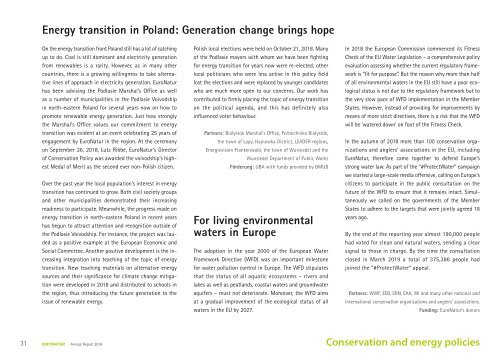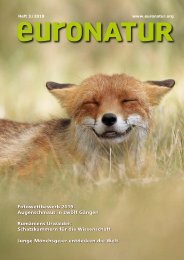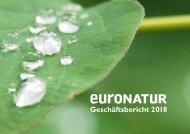Annual Report 2018 EuroNatur Foundation
Here you can get a good overview about our conservation programmes in Europe. Conatains also financial information.
Here you can get a good overview about our conservation programmes in Europe. Conatains also financial information.
Create successful ePaper yourself
Turn your PDF publications into a flip-book with our unique Google optimized e-Paper software.
Energy transition in Poland: Generation change brings hope<br />
On the energy transition front Poland still has a lot of catching<br />
up to do. Coal is still dominant and electricity generation<br />
from renewables is a rarity. However, as in many other<br />
countries, there is a growing willingness to take alternative<br />
lines of approach in electricity generation. <strong>EuroNatur</strong><br />
has been advising the Podlasie Marshal’s Office as well<br />
as a number of municipalities in the Podlasie Voivodship<br />
in north-eastern Poland for several years now on how to<br />
promote renewable energy generation. Just how strongly<br />
the Marshal’s Office values our commitment to energy<br />
transition was evident at an event celebrating 25 years of<br />
engagement by <strong>EuroNatur</strong> in the region. At the ceremony<br />
on September 26, <strong>2018</strong>, Lutz Ribbe, <strong>EuroNatur</strong>’s Director<br />
of Conservation Policy was awarded the voivodship’s highest<br />
Medal of Merit as the second ever non-Polish citizen.<br />
Over the past year the local population’s interest in energy<br />
transition has continued to grow. Both civil society groups<br />
and other municipalities demonstrated their increasing<br />
readiness to participate. Meanwhile, the progress made on<br />
energy transition in north-eastern Poland in recent years<br />
has begun to attract attention and recognition outside of<br />
the Podlasie Voivodship. For instance, the project was lauded<br />
as a positive example at the European Economic and<br />
Social Committee. Another positive development is the increasing<br />
integration into teaching of the topic of energy<br />
transition. New teaching materials on alternative energy<br />
sources and their significance for climate change mitigation<br />
were developed in <strong>2018</strong> and distributed to schools in<br />
the region, thus introducing the future generation to the<br />
issue of renewable energy.<br />
Polish local elections were held on October 21, <strong>2018</strong>. Many<br />
of the Podlasie mayors with whom we have been fighting<br />
for energy transition for years now were re-elected; other<br />
local politicians who were less active in this policy field<br />
lost the elections and were replaced by younger candidates<br />
who are much more open to our concerns. Our work has<br />
contributed to firmly placing the topic of energy transition<br />
on the political agenda, and this has definitely also<br />
influenced voter behaviour.<br />
Partners: Bialystok Marshal‘s Office, Politechnika Bialystok,<br />
the town of Lapy, Hajnowka District, LEADER regions,<br />
Energievision Frankenwald, the town of Wunsiedel and the<br />
Wunsiedel Department of Public Works<br />
Förderung: UBA with funds provided by BMUB<br />
For living environmental<br />
waters in Europe<br />
The adoption in the year 2000 of the European Water<br />
Framework Directive (WFD) was an important milestone<br />
for water pollution control in Europe. The WFD stipulates<br />
that the status of all aquatic ecosystems – rivers and<br />
lakes as well as peatlands, coastal waters and groundwater<br />
aquifers – must not deteriorate. Moreover, the WFD aims<br />
at a gradual improvement of the ecological status of all<br />
waters in the EU by 2027.<br />
In <strong>2018</strong> the European Commission commenced its Fitness<br />
Check of the EU Water Legislation – a comprehensive policy<br />
evaluation assessing whether the current regulatory framework<br />
is “fit for purpose”. But the reason why more than half<br />
of all environmental waters in the EU still have a poor ecological<br />
status is not due to the regulatory framework but to<br />
the very slow pace of WFD implementation in the Member<br />
States. However, instead of providing for improvements by<br />
means of more strict directives, there is a risk that the WFD<br />
will be ‘watered down’ on foot of the Fitness Check.<br />
In the autumn of <strong>2018</strong> more than 100 conservation organizations<br />
and anglers’ associations in the EU, including<br />
<strong>EuroNatur</strong>, therefore came together to defend Europe’s<br />
strong water law. As part of the “#ProtectWater“ campaign<br />
we started a large-scale media offensive, calling on Europe’s<br />
citizens to participate in the public consultation on the<br />
future of the WFD to ensure that it remains intact. Simultaneously<br />
we called on the governments of the Member<br />
States to adhere to the targets that were jointly agreed 18<br />
years ago.<br />
By the end of the reporting year almost 190,000 people<br />
had voted for clean and natural waters, sending a clear<br />
signal to those in charge. By the time the consultation<br />
closed in March 2019 a total of 375,386 people had<br />
joined the “#ProtectWater“ appeal.<br />
Partners: WWF, EEB, ERN, EAA, WI and many other national and<br />
international conservation organizations and anglers’ associations.<br />
Funding: <strong>EuroNatur</strong>’s donors<br />
31<br />
<strong>Annual</strong> <strong>Report</strong> <strong>2018</strong><br />
Conservation and energy policies





